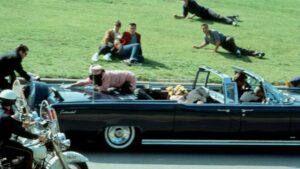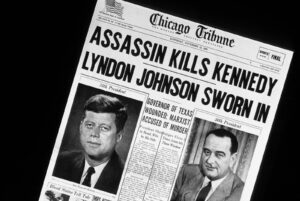 (Image found here.)
(Image found here.)
In America 60 years ago today was a Friday. However, for me in the ninth grade, it was already Saturday.
The assassination of JFK is a milestone in US history, and with us in the boomer-age crowd, the event was/is a kind of loud scream in the dark, tightly earmarked on all our personal, historical calendars. And on that particular occasion, I was about to turn 15 years old — birthday the following week — and then newly arrived at Itazuke, a US Air Force base located near Fukuoka on Japan’s most-southern island, Kyushu. My dad was in the civil service with the Department of Defense and had accepted a supposedly two-year tour at the base, but for some reason unknown to me (then and now) our time was cut short (as were a shitload of others) and we returned to the states the following summer. (Itazuke was eventually returned to Japanese control in March 1972.)
Even after six decades, and me getting old as shit (75 next week), the time has become to feel maybe this shit happened like yesterday. Kennedy was a focal point for the young me as the 1960 election had been the first one I’d been fully aware of, and I continued on, following JFK’s press conferences on TV in the afternoons after school and all the assorted parts of his presidency. JFK/Jackie was awesome. We even had comedian Vaughn Meader’s album, The First Family: ‘The First Family was an absolute phenomenon. People had never heard their political leaders made fun of this way, but within a year of the album’s release, President Kennedy had been assassinated and the record had completely disappeared from existence. After the destruction of every unsold copy, the album wasn’t commercially available until 1999.‘
Meader’s career completely tanked after Dallas. He died in 2004.
A nutshell account of the shooting via the JFK Library:
A light rain was falling on Friday morning, November 22, but a crowd of several thousand stood in the parking lot outside the Texas Hotel where the Kennedys had spent the night. A platform was set up and the president, wearing no protection against the weather, came out to make some brief remarks. “There are no faint hearts in Fort Worth,” he began, “and I appreciate your being here this morning. Mrs. Kennedy is organizing herself. It takes longer, but, of course, she looks better than we do when she does it.” He went on to talk about the nation’s need for being “second to none” in defense and in space, for continued growth in the economy and “the willingness of citizens of the United States to assume the burdens of leadership.”
The warmth of the audience response was palpable as the president reached out to shake hands amidst a sea of smiling faces.
Back inside the hotel the president spoke at a breakfast of the Fort Worth Chamber of Commerce, focusing on military preparedness. “We are still the keystone in the arch of freedom,” he said. “We will continue to do…our duty, and the people of Texas will be in the lead.”
The presidential party left the hotel and went by motorcade to Carswell Air Force Base for the thirteen-minute flight to Dallas. Arriving at Love Field, President and Mrs. Kennedy disembarked and immediately walked toward a fence where a crowd of well-wishers had gathered, and they spent several minutes shaking hands.
The first lady received a bouquet of red roses, which she brought with her to the waiting limousine. Governor John Connally and his wife, Nellie, were already seated in the open convertible as the Kennedys entered and sat behind them. Since it was no longer raining, the plastic bubble top had been left off. Vice President and Mrs. Johnson occupied another car in the motorcade.
The procession left the airport and traveled along a ten-mile route that wound through downtown Dallas on the way to the Trade Mart where the President was scheduled to speak at a luncheon.
Crowds of excited people lined the streets and waved to the Kennedys. The car turned off Main Street at Dealey Plaza around 12:30 p.m. As it was passing the Texas School Book Depository, gunfire suddenly reverberated in the plaza.
Bullets struck the president’s neck and head and he slumped over toward Mrs. Kennedy. The governor was shot in his back.
The car sped off to Parkland Memorial Hospital just a few minutes away. But little could be done for the President. A Catholic priest was summoned to administer the last rites, and at 1:00 p.m. John F. Kennedy was pronounced dead. Though seriously wounded, Governor Connally would recover.
The president’s body was brought to Love Field and placed on Air Force One. Before the plane took off, a grim-faced Lyndon B. Johnson stood in the tight, crowded compartment and took the oath of office, administered by US District Court Judge Sarah Hughes. The brief ceremony took place at 2:38 p.m.
Less than an hour earlier, police had arrested Lee Harvey Oswald, a recently hired employee at the Texas School Book Depository. He was being held for the assassination of President Kennedy and the fatal shooting, shortly afterward, of Patrolman J. D. Tippit on a Dallas street.
Half a world away, early Saturday, maybe near-about dawn, my younger brother woke me up with some news he’d heard on his little transistor radio — via the US military’s Far East Network (FEN) of radio and television stations, primarily serving U.S. Forces in Japan, Okinawa, the Philippines, and Guam — that Kennedy had been shot.
My parents woke and the household came alive with the sound of two/three radios going at once. We lived off base, though not far from the front gates, and I think our neighbors (other Americans) eventually started chattering with my parents all morning about the whole ugly affair. It being Saturday, there was no school. And the whole memory of that day is underscored by Itazuke’s near-about shutting down its fringe operations, like the base theater, library, and BX (‘base exchange‘).
Youth and maybe physical distance from the subject matter resulted in the shooting being of less significance/importance to me that day than it would become later.
My most fevered recollection was the base gym also being closed that day. I was in the final throes of a multi-year (since sixth grade) period of a lot of athletic endeavors, especially with baseball and basketball — I was on Itazuke High School’s B-Team basketball squad that year and later also its baseball team) — and routinely visited the base gym on weekends to catch pick-up games, or just practice. I loved sports in them days. A sense I dropped like a rock the further I got into high school.
Yet this particular Saturday I was pissed the gym was locked. I remember bouncing my basketball for a short time on the front sidewalk filled with self-righteous hurt and rage, then went home, wondering why in the world would the gym be closed. Not only was I not so political and didn’t understand the sense/scope of the event, I was really, really naive, too.
Meanwhile, back in the US:
Of course, I was also out of the country on the second big boomer event quickly following the JFK shooting — the Beatles’ arrival in America. And the ‘Fab Four’ would help end my being involved in sports.
For us boomers, however, the Kennedy assassination is the event of our lives. Although I was out of the country, I still remember vividly the moment my brother woke me up and my parents and the people who lived there around us, all the noise and confusion of that day.
American history stood still for a short space, and once it started again, hasn’t really been the same since.
History rocks, or not, yet once again here we are…
 (Illustration out front found here.)
(Illustration out front found here.)